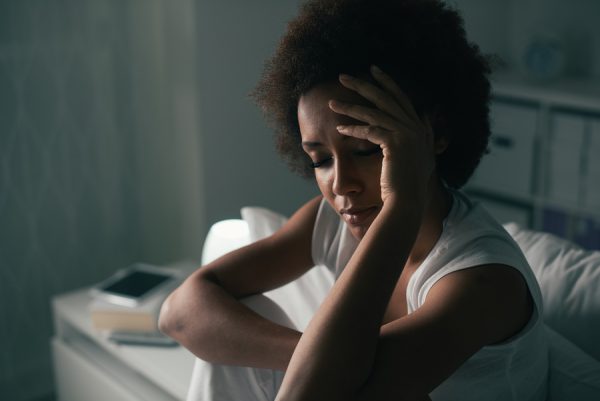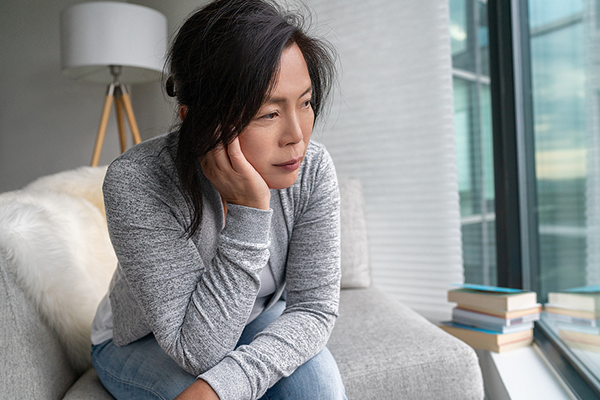It is literally the worst feeling in the world.
You know you have to sleep. You long to sleep. But that drifting-off feeling just won’t come. You lay on your back, you punch your pillow and roll onto one side, then the other, then on your back again. You try not to check the clock because it makes it worse to know that an hour has passed, but you can’t help it. The sleep seems so close, but it just won’t come.
Insomnia or trouble sleeping happens to all of us at some point in our lives. A lot of the time, it’s just insomnia before a big test or a big event the next day. Or maybe you can’t sleep because you’ve gotten used to waking up with a young child. But millions of us lay awake every night because of chronic insomnia—trouble sleeping due to an uncertain cause that lasts six weeks or more.
Some people need as little as four hours of sleep a night. Others need 10. But the perfect amount of sleep for you is the number of hours that makes you feel refreshed when you wake in the morning. “Six to eight hours is the average amount of sleep an adult should aim for every night,” said Dr. Amy Blanchard, medical director at the Augusta University Health Sleep Disorders Center. “But in our world of 24/7 access to social media, smart phones and other devices, that’s easier said than done.”
What’s causing your insomnia?
According to Blanchard, insomnia can fall into several categories:
- You struggle to fall asleep at bedtime: This problem is most commonly related to a busy lifestyle. “You can’t turn your mind off—you’re laying there thinking about stuff you have to do, commitments you’ve missed, etc.,” said Blanchard.
- You can fall asleep easily, but wake at 2 or 3 a.m. and have trouble falling back asleep: If you wake up and can’t fall asleep again, it could be due to stress, depression or anxiety.
- You aren’t sleeping well because of an underlying medical issue: People with obstructive sleep apnea may be getting the hours of sleep they need, but it’s not deep restorative sleep since they’re constantly waking up because of their medical condition. This is the easiest type of insomnia to fix since there’s a physical—and entirely treatable—cause.
Better sleep on the way
If you’re a parent, you know the importance of having a good sleep routine for kids. But a sleep routine is good practice for anyone.
Your adult version could include not drinking caffeine after lunch; avoiding alcohol (since it can disrupt sleep in the latter half of the night); making sure to stop watching all electronics at least an hour before bedtime—and that includes setting notifications to silent; a warm bath; reading a good book; then turning off the light and going to sleep in a cool, dark room. For some, white noise—even just the noise of a fan—is helpful to soften any traffic or other background noises. But if your TV is in your bedroom, move it out. You may say that you depend on it for the white noise, but the light from the TV could be hurting how well you can sleep.
If the issue is that your mind is racing with things to do, keep a pad next to your bed and do a brain dump: Write everything down so you have the comfort of knowing everything’s somewhere so you won’t forget—and don’t have to worry about it until the next day.
Many of us work in settings where we sit for most of the day, which means our minds are tired but our bodies aren’t. That could also be wrecking your sleep. So aim to work out for 30 minutes each day—but carve out that workout anytime except right before bed as the adrenaline from exercising could turn around and keep you awake.
Over-the-counter remedies can also help. Melatonin is very safe to use—try taking a tablet about an hour or so before your bedtime. Antihistamines like Benadryl have long been used for their sleep-inducing properties—but a side effect could be leaving you feeling “hung over” the next day and your mouth and eyes to feel dry.
So you’ve done the sleep routine—now what?
Say you’ve done the sleep routine and you’re still not sleeping. It’s very likely that your anxiety about not sleeping is actually keeping you awake.
“It’s important to know that insomnia is treatable, but the problem is that it can become self-perpetuating,” said Blanchard. “For someone who’s had insomnia for a week or more, suddenly the bedroom itself can become a source of stress and frustration, instead of being comfy and relaxing.”
Sound familiar? But before you decide to move to the guest bedroom or sofa, reach out to a sleep specialist instead. He or she can make sure there’s not an underlying medical reason why you’re not sleeping and can prescribe other medications that can help.
For chronic insomnia, however, a sleep specialist is likely to refer you to cognitive behavioral therapy (CBT) with a psychologist. Don’t buy into the stigma—research has shown that CBT consistently works to help those with insomnia sleep better. The therapy coaches patients on a variety of factors that could be affecting their sleep, including relaxation training to help calm your mind and body, learning how to avoid trying to fall asleep (and any related anxiety), biofeedback so that you can observe heart rate and muscle tension and avoid triggers, and more.
The techniques, said Blanchard, can be taught in as few as four sessions. Sleep aids during this time help offer positive reinforcement so that you can get used to sleeping better again.
When you’re living with insomnia, it can seem like a long night that will never end. But, Blanchard emphasizes, insomnia really is treatable. “However, don’t just depend on the medications,” she said. “In the short term, they’re great. But if you don’t do anything else, it can get to the point where they no longer help you sleep. Work on your sleep routine, improve your sleep environment, and talk to a specialist if you’re still struggling.”
Because we all know—when that great night of sleep happens—there’s no feeling like it in the world.





